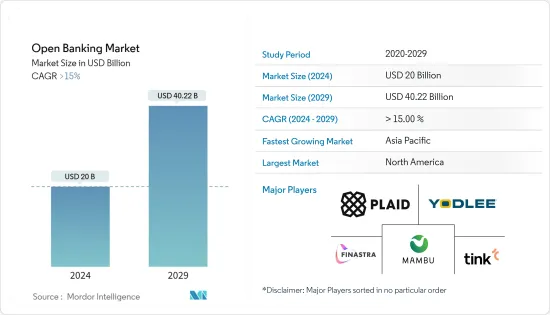PUBLISHER: Mordor Intelligence | PRODUCT CODE: 1521568

PUBLISHER: Mordor Intelligence | PRODUCT CODE: 1521568
Open Banking - Market Share Analysis, Industry Trends & Statistics, Growth Forecasts (2024 - 2029)
The Open Banking Market size is estimated at USD 20 billion in 2024, and is expected to reach USD 40.22 billion by 2029, growing at a CAGR of greater than 15% during the forecast period (2024-2029).

Open Banking is a new financial paradigm that is gaining traction as the digital revolution spreads around the world. It symbolizes a change in banking towards a more unified, customer-focused strategy supported by technology and data sharing. Open banking, which provides application programming interfaces (APIs) for third parties to access financial data while adhering to data privacy regulations, is becoming increasingly popular. With this, customers can access a wide range of financial services and products. Numerous startups have invested in frontier fintech ideas and related advancements. Banks can use actionable insights from account aggregation by utilizing Open Banking APIs. Banks can learn more about their consumers and how to better serve them by partnering with third-party aggregators or becoming their aggregators. With the backing of US financial institutions and the FDX standard, Envestnet has expanded its Open Banking links significantly in recent times. Leading banks and fintechs in the sector have already teamed up to create innovative solutions utilizing the FDX API, which provides 660 data elements.
Open Banking Market Trends
Open Bank Users Growth is Propelling in Asia-Pacific
In the Asia-Pacific region, the growth of open banking users is driven by factors such as increasing digitalization, evolving consumer preferences, and innovation in the financial sector. While several nations, such as South Korea, Japan, Singapore, and India, have less formal or mandatory Open Banking policies, their governments are implementing several initiatives to encourage and hasten the adoption of data-sharing frameworks in the banking industry. An API Playbook has been released in Singapore by MAS and the Association of Banks to facilitate communication and data sharing between banks and Fintechs. The FSA in Japan has imposed requirements on banks to disclose their Open APIs policy, created a procedure for TPP authorization, and encouraged banks to enter into contracts with a minimum of one TPP.
Rise in Payments is Fuelling the Market
The market for open banking is expanding due to the rapid growth of digital payments. The open banking sector is growing as a result of the increase in the use of online payment platforms. Conventional payment methods such as credit cards frequently entail middlemen and extra charges. However, open banking empowers customers to initiate payments directly from their bank account, bypassing intermediaries and reducing transaction costs. This process benefits consumers and encourages competition among payment service providers, leading to the development of innovative payment solutions. Moreover, open banking enables faster payment processing, ensuring that transactions are completed swiftly and efficiently. Overall, the rise in payments is a driving force behind the expansion and adoption of open banking.
Open Banking Industry Overview
The Open Banking Market is moderately consolidated. The report covers the major players operating in the open banking market. The market is expected to grow during the forecast period due to international trade and investments, infrastructure development, and many other factors driving the market. Some prominent players include Plaid, Yodlee, Tink, Finastra, and Mambu.
Additional Benefits:
- The market estimate (ME) sheet in Excel format
- 3 months of analyst support
TABLE OF CONTENTS
1 INTRODUCTION
- 1.1 Study Assumptions and Market Definition
- 1.2 Scope of the Study
2 RESEARCH METHODOLOGY
3 EXECUTIVE SUMMARY
4 MARKET DYNAMICS
- 4.1 Market Overview
- 4.2 Market Drivers
- 4.2.1 Increased Demand for Personalized and Convenient Financial Services
- 4.3 Market Restraints
- 4.3.1 Ensuring the Security and Privacy of Customer Data
- 4.4 Market Opportunities
- 4.4.1 Ability to Create Personalized and Tailored Financial Experiences for Customers
- 4.5 Value Chain / Supply Chain Analysis
- 4.6 Porters 5 Force Analysis
- 4.6.1 Threat of New Entrants
- 4.6.2 Bargaining Power of Buyers/Consumers
- 4.6.3 Bargaining Power of Suppliers
- 4.6.4 Threat of Substitute Products
- 4.6.5 Intensity of Competitive Rivalry
- 4.7 Insights on Technological Innovations in the Market
- 4.8 Impact of Covid-19 on the Market
5 MARKET SEGMENTATION
- 5.1 By Banking Services
- 5.1.1 Banking & Capital Market
- 5.1.2 Payments
- 5.1.3 Digital Currencies
- 5.1.4 Value-Added Services
- 5.2 By Distribution Channel
- 5.2.1 Bank Channel
- 5.2.2 App Market
- 5.2.3 Distributors
- 5.2.4 Aggregators
- 5.3 By Deployment Model
- 5.3.1 On-Premises
- 5.3.2 Cloud
- 5.3.3 Hybrid
- 5.4 Geography
- 5.4.1 North America
- 5.4.1.1 US
- 5.4.1.2 Canada
- 5.4.1.3 Mexico
- 5.4.1.4 Rest of North America
- 5.4.2 Europe
- 5.4.2.1 Germany
- 5.4.2.2 UK
- 5.4.2.3 France
- 5.4.2.4 Russia
- 5.4.2.5 Spain
- 5.4.2.6 Rest of Europe
- 5.4.3 Asia Pacific
- 5.4.3.1 India
- 5.4.3.2 China
- 5.4.3.3 Japan
- 5.4.3.4 Rest of Asia Pacific
- 5.4.4 South America
- 5.4.4.1 Brazil
- 5.4.4.2 Argentina
- 5.4.4.3 Rest of South America
- 5.4.5 Middle East
- 5.4.5.1 UAE
- 5.4.5.2 Saudi Arabia
- 5.4.5.3 Rest of Middle East
- 5.4.1 North America
6 COMPETITIVE LANDSCAPE
- 6.1 Market Concentration
- 6.2 Company Profiles
- 6.2.1 Plaid
- 6.2.2 Yodlee
- 6.2.3 Tink
- 6.2.4 Finastra
- 6.2.5 Mambu
- 6.2.6 Token.io
- 6.2.7 TrueLayer
- 6.2.8 Axway
- 6.2.9 Salt Edge
- 6.2.10 FIS*
7 MARKET FUTURE TRENDS
8 DISCLAIMER AND ABOUT US




